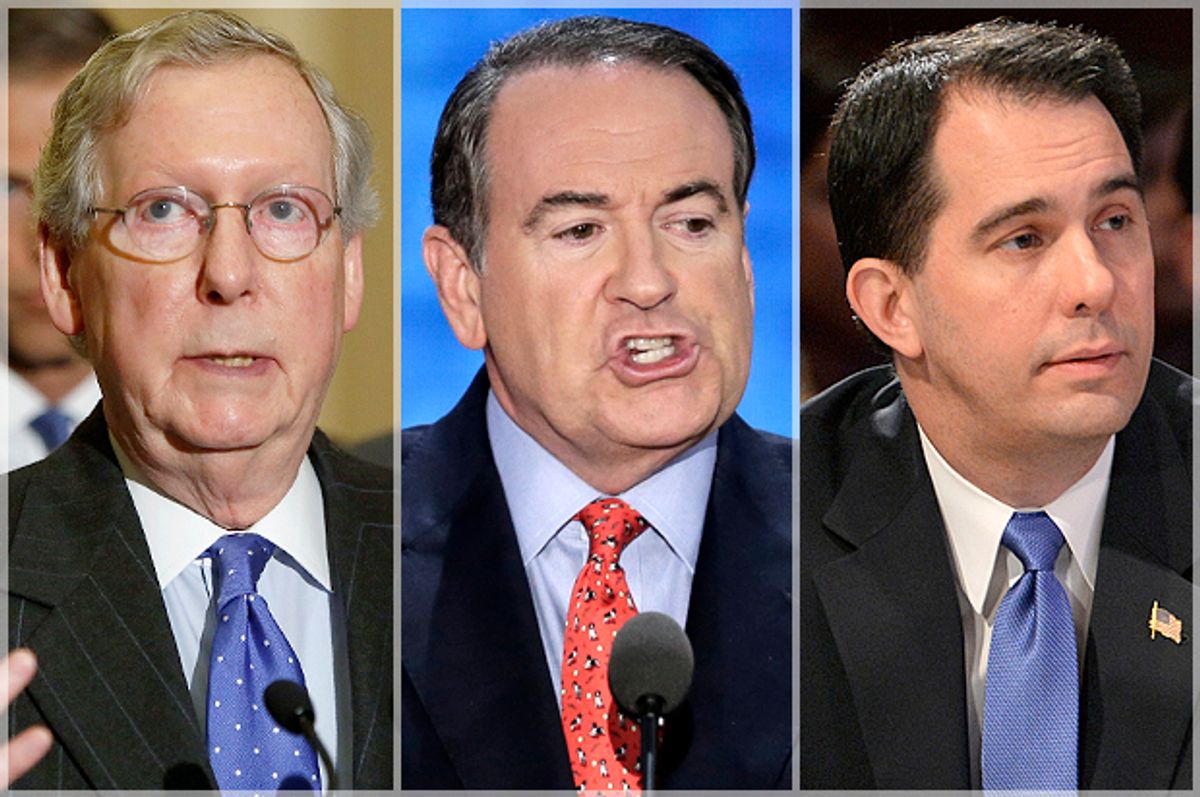Wisconsin Gov. Scott Walker doesn't want to talk about equal marriage, at least not so much anymore. "I don't think the Republican Party is fighting it," Walker said last month when asked about the issue. "I'm not saying it's not important, but Republicans haven't been talking about this. We've been talking about economic and fiscal issues. It's those on the left that are pushing it." Now it's totally weird for a guy who is on the record as being pretty into his state's ban on equal marriage and is currently defending it in court to say he's done fighting the changing tides, but it's also the new GOP line at a moment when they are falling increasingly out of step with the public on everything from LGBTQ rights to contraception.
As John Harwood pointed out on Tuesday in the New York Times, Democrats have been hammering Republicans hard on these issues, which has left many conservatives scrambling to deflect questions or clarify their records -- particularly when it comes to reproductive rights:
Ed Gillespie, the Republican Senate candidate in Virginia, argued that Senator Mark Warner, the Democratic incumbent, was “making up my views” when Mr. Warner accused him of seeking to overturn abortion rights and ban some forms of contraception. In fact, Mr. Gillespie, a former Republican National Committee chairman, said in a recent debate, he wants contraceptives available (behind the counter) at pharmacies without a prescription.
Representative Cory Gardner, a Republican in a tight Senate race in Colorado, proposed the same thing after the Supreme Court’s decision on the Hobby Lobby case exempted some private businesses from covering certain contraceptives in health insurance plans. He was shielding himself from attacks by Senator Mark Udall, a Democrat, who has spent months slamming Mr. Gardner’s “radical agenda” on abortion and family planning.
After years spent setting the terms of the national debate and wearing their opposition to reproductive rights as a badge of honor, Republicans may finally be in a defensive crouch. Just this week, we saw Rand Paul tell an audience in Iowa that "almost nobody in here wants to ban birth control" while -- as Harwood noted -- Republicans across the country are struggling to make the same case. The Supreme Court's Hobby Lobby decision may have been welcome news to the Green family, and it may have even made Republicans feel pretty good about so-called religious liberty, but politicizing birth control doesn't bode well for the party's long-term prospects.
While Americans are about evenly divided on the case (49 percent disapprove of the decision while 47 approve), their views on contraception are much more pro-contraception than anything else. Overwhelming majorities -- including among Catholics and Republicans -- think birth control is "morally acceptable," which, sure, is a pretty low bar but is certainly something. But perhaps the more relevant data point here is that a majority of Americans, 54 percent, support the contraception mandate in the Affordable Care Act. That support is even stronger -- 62 percent -- among women voters, the voters that Republicans are really going to need to win over to ensure their survival. The GOP's pathological opposition to the contraceptive requirement of the new healthcare law -- as well as state-level assaults on clinics and support for personhood amendments that would greatly compromise access to contraception among other things -- puts them on the outs with where most Americans are on these issues.
When it comes to young voters, college graduates, single women and black and Latino voters, support for contraception is really, really strong. According to data from 2012, 81 percent of black Americans and 79 percent of Hispanic Americans strongly support expanding access to birth control. More than 60 percent of millennial voters support the birth control mandate.
These are the people Republicans need to win elections, and these are the people who Democrats hope are listening when they put Republicans on the spot to defend their records. Talking about religious liberty may not be enough anymore; advocating for increased access to over-the-counter methods of birth control may no longer cut it when employer insurance plans are trying to drop highly effective and costly methods like the copper IUD that can't be obtained in pharmacies. And a friendly assurance from Rand Paul that no one is coming after birth control may not be enough to cover for a record that shows quite the opposite. Shaking the anti-woman, retro-misogynist label will be even tougher for Republicans like Mitch McConnell who are fighting to bolster the Hobby Lobby decision by letting bosses everywhere deny employees all manner of contraception. Or for Scott Walker, who is trying to make nice with moderate America in advance of a likely presidential run, but is also making the Hobby Lobby ruling the law of the land in his state. And, yeah, the parade of former presidential wannabes like Mike Huckabee spouting off about "Uncle Sugar" certainly doesn't help the GOP's cause much, either.
Republicans like Gillespie and Gardner may be able to buy some time by claiming to be for birth control while supporting policies that deny people access, but with increased Democratic scrutiny and shifting demographics, they're eventually going to have to pony up and prove it if they want to survive.

Shares